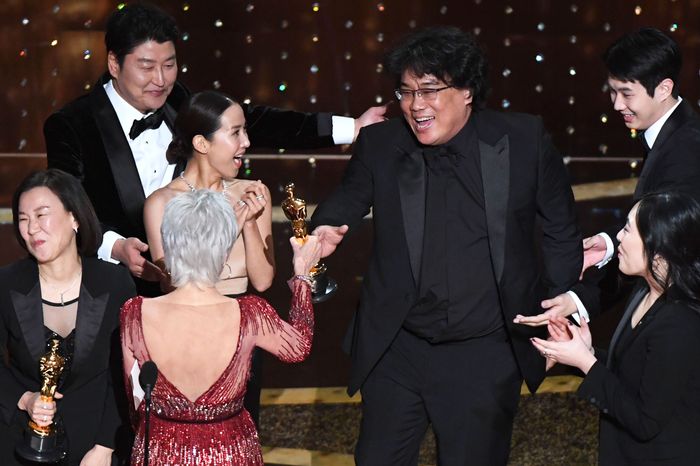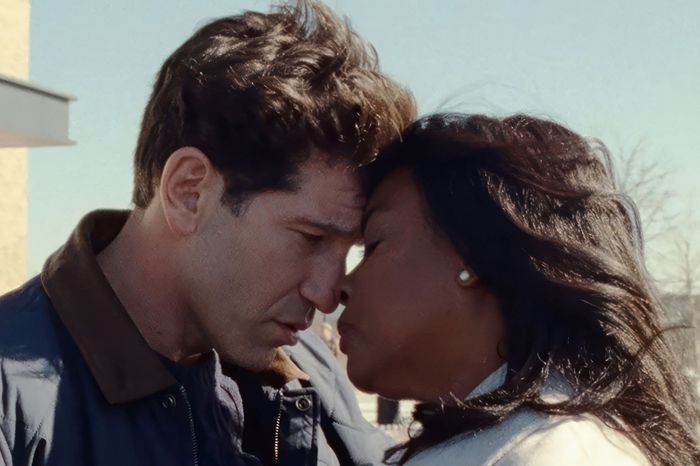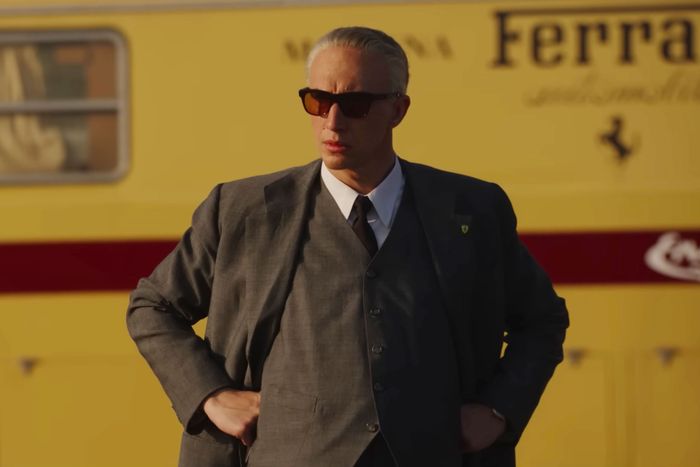
Way back before the Hollywood strike, before the pandemic, before even the streaming wars as we know them, the Anne Hathaway monster-metaphor dramedy Colossal rampaged into theaters: the first and only release from “upstart indie” film distributor Neon. This was 2017, and Spanish director Nacho Vigalondo’s take on the kaiju subgenre — about an unemployed drunk who’s psychically linked to a skyscraper-size creature capable of leveling humanity — suggested much about the nascent company’s ambitions. Speaking on a panel at the Zurich Summit later that year, Neon chief executive Tom Quinn outlined his rationale for Colossal specifically, and Neon going forward, articulating a then-somewhat-radical vision to super-serve a niche moviegoing demographic: audiences “that skew under 45, that have no aversion to violence, no aversion to foreign language and to nonfiction.”
At the time, ultraviolent genre fare was popular in a cultish, Tarantino kind of way and could be intermittently commercial but wasn’t broadly considered reliable ticket-selling fare. And outside of the Chinese-language Ang Lee martial-arts epic Crouching Tiger, Hidden Dragon (and to a lesser extent, Life is Beautiful, Pan’s Labyrinth, and Amélie), non-American movies seldom achieved liftoff at the box office. Indeed, Quinn’s bet on Colossal didn’t exactly pay off; the movie grossed $4.5 million globally on a reported $15 million budget.
Perhaps no one outside the former Viz-a-Video video store clerk Quinn could have predicted what happened next. In 2018, Neon acquired the U.S. and Canadian rights to Bong Joon Ho’s movie Parasite. Quinn was well-acquainted with Bong’s work, having helped release the director’s neo-noir Mother while he was co-CEO of Magnolia Pictures and the sci-fi action hit Snowpiercer when he was co-chief of Radius-TWC. Neon took Parasite to the 2019 Cannes Film Festival in May, where it won the Palme d’Or and hosannas from critics. By September, when it screened at the Toronto International Film Festival, the movie boasted a 99 percent Rotten Tomatoes rating. Coasting off the buzz, Neon rushed forward with the film’s U.S. rollout that October, releasing Parasite in just three theaters.
“A lot of my friends in the industry were like, ‘Dude, what’s wrong with you? Nobody opens a foreign-language film inside Oscar season,’” Quinn tells Vulture. “A really well-known distributor of foreign-language films said to me, ‘Why wouldn’t you wait until next year?’ I was like, ‘There are no rules.’”
By February 2020, the film had platformed to wide release in over 2,000 theaters, eventually accumulating close to $263 million at the global box office (a robust $53 million domestically). Parasite had done the impossible, becoming a critical and commercial art-house smash. But it would go on to achieve something even more astonishing that month when it became the first foreign-language film to ever best Hollywood’s homegrown product to win Best Picture, nabbing a best director Oscar for Bong Joon Ho and walking away with trophies for Best Original Screenplay and Best International Feature, among others. In one fell swoop, Parasite justified Quinn’s gamble, situating Neon as Hollywood’s chief cheerleader of foreign film.
Four years later, the company is attempting to solidify its title. Ahead of the 2024 Academy Awards, Neon has captured another Best Picture nomination for Justine Triet’s French-, German- and English-language film Anatomy of a Fall, a Palme d’Or winner (Neon’s fourth) that the studio waited to release in theaters until awards season was in full swing, building interest until the film was announced alongside Oppenheimer and Barbie as in contention for the Oscar. The courtroom psychothriller hit screens to a modest $4.1 million domestic gross but 96 percent Tomatometer rating, securing Best Director, Original Screenplay, Film Editing, and Best Actress Oscar nods, too. It’s hardly the front-runner, but it’s not exactly a long shot; Anatomy has already won Golden Globes for Best Foreign Language Film and Best Screenplay, as well as a BAFTA in the latter category.
Earning its second Best Picture trophy for an international feature would certainly cement Neon’s status as the most efficient champion of imported film in America. It would also place the studio on an even line with its primary rival, A24. Overall, Neon is tied with A24 for Oscar nominations this year — with seven each. To make matters more interesting, the companies are sharing custody of German actress Sandra Hüller, who is nominated for her lead role in Anatomy of a Fall as well as her supporting part in A24’s Nazi drama Zone of Interest — also nominated for Best Picture, A24’s first attempt at the trophy with a non-English-language film.
Quinn, for his part, is magnanimous about the competition, heaping praise on A24’s 2017 Best Picture win for Moonlight as a kind of “all boats rise” success for indie filmdom, and expressing admiration verging on jealousy for A24 closing the deal to release Spring Breakers in 2012. “I’m not going to sell a $60 candle,” Quinn says with a shrug, taking a gentle pot shot at his opponent’s notorious merch game, which this year includes an eyeliner kit branded to Sofia Coppola’s Priscilla. “That feels insincere and not our mission and I’m happy to say it loudly and proudly. I think selling merchandise is awesome and we will sell merchandise and we will be compared to A24 when we do it. But it will never be something that places the importance of the company over the films we work with.” (A24 declined to comment for this story.)
“We never call film ‘content,’” he adds. “A Neon film, you don’t consume. You feel a Neon film.”
In a post-Parasite world, Neon has thrown much of its might into Anatomy, but it placed other bets this season, too. In early December, the company released director William Oldroyd’s adaptation of Ottessa Moshfegh’s period potboiler Eileen, a critical breakout at last year’s Sundance that features another brassy performance by Hathaway. Eileen grossed a mere $1.5 million over its five-week box-office run before heading straight to video on demand (where it cracked the top 15) and was nominated for an Independent Spirit Award. There was a quiet, one-week, Academy Awards-qualifying run for German film icon Wim Wenders’s Japanese-language drama Perfect Days, which nabbed a Best Actor award for lead Koji Yakusho at Cannes and is now up for a Best International Feature Oscar.
Over Christmas, the distributor released Ferrari, Michael Mann’s long-gestating $95 million biopic starring Adam Driver as the maverick sports-car visionary Enzo Ferrari — Neon’s biggest-budgeted and arguably most mainstream Hollywood project to date. Quinn saw Ferrari as a potential Oscars “horse” and went full throttle in pursuit of its rights, besting other studios and streamers (he declines to name) to “pay the most we’ve ever paid for a film.” (Ferrari had already been majority financed by mid-budget movie upstart STX Entertainment, which went out of business in 2022, leaving Mann’s movie without North American distribution.)
“I put my arm around him and go, ‘Michael, if we do this, it’s not going to be the first time that we work together,’” Quinn recalls of the deal. “He’s like, ‘What?’ I’m like, ‘Yeah, we already made a movie together. I was an extra in Last of the Mohicans.’” (Quinn was not joking.)
Ferrari earned a six-minute standing ovation at the Venice Film Festival but was ultimately not an Oscars horse; it was shortlisted for several categories but received no nominations. To date, Ferrari has grossed $39.4 million worldwide at the box office. Taking into account home entertainment and pay-TV revenues, Neon says it broke even with the movie at around $18 million while foreign investors will take the brunt of the financial losses on investment.
Similarly snubbed by the Academy was Ava DuVernay’s Origin, Neon’s second biggest prints-and-advertising commitment to date when it comes to wide theatrical release. Based on Pulitzer-winning writer Isabel Wilkerson’s influential nonfiction best seller Caste: The Origins of Our Discontents, the $38 million biodrama is the second-highest-budgeted film Neon has acquired. The intertwined story, in which a personal-tragedy narrative combines with a reporter’s globe-hopping investigation into the roots of systemic racism, arrived with the highest test-screening scores in Neon’s history, surpassing even Parasite in the amount of “total positive” and “definite recommend” responses, Quinn says. Neon acquired Origin’s distribution rights (originally set up with Netflix before DuVernay and the platform parted ways) ahead of its premiere at the Venice Film Festival in September, where DuVernay became the first Black woman director to put a film in competition in the fest’s 80-year history, and gave it a brief Oscars-qualifying run. It officially platformed to nearly 700 screens but so far has made only $4.3 million in domestic-only release.
According to Quinn, Neon’s compression — if not outright closure — of standard theatrical windowing (in which a film arrives online around three months after receding from the multiplex) renders conventional box-office tallies useless. Theatrical distribution gives a film’s streaming release incalculable added value, he explains. To wit: Swedish director Ruben Östlund’s class-warfare satire Triangle of Sadness only grossed $4.6 million domestically but remained a top-five performer on home-entertainment-VOD charts for 12 weeks to do what Quinn calls “big business.”
Still, a key piece of Neon’s historic awards streak has been its commitment to theatrical releases — notably for the type of international films that might otherwise find a natural home on streaming: the 2021 Norwegian romantic dramedy The Worst Person in the World, the 2021 animated Afghan refugee documentary Flee, the 2019 Macedonian beekeeper documentary Honeyland, and Triangle of Sadness from 2022 all received theatrical rollouts. Its 2018 Aretha Franklin documentary Amazing Grace played in theaters for an astonishing 50 weeks and the Critics’ Choice Award–winning space doc Apollo 11 grossed a robust $15 million to help Neon “reignite interest in theatrical documentaries,” in the words of former Fox Searchlight co-chair Steven Giulia. Three of these five films — all from directors outside the United States — were nominated for Oscars, with Apollo 11 successfully campaigning for Emmys despite a nearly 600-theater big-screen rollout.
A marketing executive who works for one of Neon’s competitors (and spoke on the condition of anonymity) points out that Harvey Weinstein, during his late-’80s/early-’90s Miramax heyday, figured out how to mainstream the release of foreign films and flog their awards recognition for bigger box office, too. “Harvey changed the foreign-film category forever; Neon is just following in his footsteps,” this person says, citing Il Postino and director Krzysztof Kieślowski’s Three Colours Trilogy (Blue, White, and Red). Nonetheless, filmmakers like Pablo Larraín, who released the 2021 Princess Di biopic Spencer with Neon, give Quinn credit for lurching the strategy forward at the right time.
“The Academy is changing because they have more and more people from foreign countries,” observes Larraín. “They have younger members every year. And Neon understood that maybe earlier than other companies.”
Back in 2016, when Quinn joined forces with Tim League — CEO/co-founder of the Alamo Drafthouse theater chain — to purchase Colossal, their nascent company had no name. The two eventually launched it as Neon (in homage to the electrode lighting found on old-timey movie palaces like Los Angeles’s Nuart Theatre) the following year, setting up offices in Brooklyn, Los Angeles, and Austin, Texas, with some seed money from Jackie Chan’s production company, SR Media. It quickly appealed to rising stars looking to co-produce films, like Aubrey Plaza, who says she’s maintained a “nerdy movie relationship” with Quinn over the years since Ingrid Goes West.
It was around this time that Neon found itself in bidding war after bidding war with A24. Neon beat out its rival (and Netflix) for rights to Ingrid at the 2017 Sundance Film Festival, partnered with Hulu to win the 2020 time-travel rom-com Palm Springs (at nearly $22 million, a historically Sundance rich deal), nabbed Larraín’s Spencer in 2021, and emerged victorious (in conjunction with Topic Studios) from a runoff for Östlund’s Triangle of Sadness at the 2022 Cannes Film Festival. Meanwhile, A24 trumped Neon at this year’s Toronto International Film Festival for the prison drama Sing Sing. At last year’s Sundance, the companies squared off over the buzzy Midnight Section horror flick Talk to Me with A24 emerging victorious. And of course at Cannes in 2017, A24 picked up North American rights to writer-director Sean Baker’s The Florida Project.
In the end, Quinn is quick to point out that beside the release of Gaspar Noé’s 2019 dance-horror thriller Climax, A24 has largely foregone foreign-language films. In fact, A24 (which is approximately four times the size of Neon, the latter employing around 55 people) has recently indicated an intention to pursue “action and big IP” projects, whereas Quinn reiterates Neon’s dedication to genre fare, having released the Palme d’Or–winning body-horror showcase Titane and David Cronenberg’s Crimes of the Future, in addition to developing and producing Brandon Cronenberg’s Infinity Pool and They Follow, filmmaker David Robert Mitchell’s much-anticipated sequel to 2014’s It Follows, in-house.
A24 pulled away in the indie-upstart cool contest (as measured by the ubiquity of A24 tote bags and dad caps on the streets of New York and L.A.), but Neon has remained consistent in its primary goal — awards recognition — from the company’s earliest days. Consider when Neon spent almost all of its initial funding to acquire the 2017 Margot Robbie ice-skating biopic I, Tonya for $5 million out of Toronto. A mere three months later, the company plunked the concussive drama-comedy into theatrical release to qualify for a 2017 Oscars run. Neon kicked off shotgun promotions with a rollicking red-band trailer — a big swerve from established awards-season protocol — then began politicking hard for awards for star-producer Robbie and co-star Allison Janney. Both actresses were nominated for Globes and Oscars with Janney walking away with a Best Supporting Actress statuette. I, Tonya grossed $53 million — a 10X return on investment — worldwide. But just before that, Neon inked a multiyear output deal with Hulu for exclusive “first window” streaming rights to its movies after their theatrical release, alleviating the pressure on box office to deliver all the company’s revenues.
The Parasite gamble was in some ways lower stakes, despite it being a title “everybody was super afraid to touch,” according to Quinn. Bong’s English-language efforts to date, Snowpiercer and the Netflix-distributed factory-farming fable Okja, were positively received but not hits, and Quinn says that he was among the few studio executives to notice the director had a history of “massive” DVD sales. “I knew Bong was a huge entity before this film,” Quinn says. “He had just never gotten the affirmation, whether it was awards or box office. But it was there. The fandom was real.”
When it became the first Korean film to win Best Picture and the first Asian Best Original Screenplay, Neon certainly celebrated. But there were losses that year too. Apollo 11 failed to get an Oscar nomination, despite winning and being nominated for a raft of precursor awards. The French historical drama Portrait of a Lady on Fire was sidelined when France opted not to put it forward as the country’s Academy Awards submission. (This year, Anatomy of a Fall became ineligible for a Best International Feature Oscar when it was passed over as France’s national selection for the less ecstatically reviewed Juliette Binoche–starring culinary love story The Taste of Things, which failed to secure any nominations.) “We had an incredible year,” Quinn says. “But … the other half of me is like, Apollo 11 was left at the altar. How could this possibly happen?”
This awards season, Ferrari’s Academy Awards snub — particularly of Penelope Cruz in the Supporting Actress category — took many gurus of gold by surprise. But the Golden Globes- and Oscars-nomination shutout of Origin left Neon executives stunned. Quinn describes theatrically distributing the film as a kind of a personal mission. (Origin’s credit sequence includes a “pay it forward” QR code allowing audience members to purchase tickets for “someone who needs one.”) “This, to me, is something that absolutely, 100 percent must be shared in the service of creating a conversation,” he says. “Of creating a cultural relevance that can change lives, can change the way we see each other. And all of the other things that come with the business, they pale in comparison to the commitment to work on movies like this.”
After the Globes ceremony, however, DuVernay took to Instagram to lament a lack of accolades for Origin lead actress Ellis-Taylor and seemingly shaded Neon for its indie approach to awards politicking. “I wish she was at the Globes or SAG Awards or Critics’ Choice Awards or the other nominations that didn’t come,” the director said in a post last month that has since been deleted. “I wish she had the commercials and magazine covers and all the things that are arranged for the actresses we are supposed to pay attention to in the awards season. I wish she felt the recognition and praise that swirls around her peers in big studio films.” (DuVernay’s agent and media representative at her distribution company, Array, did not respond to interview requests from Vulture.)
“We too are frustrated by the lack of awards recognition for Origin,” Quinn says. “There are no guarantees and in many ways, the industry and the awards themselves can be systemically unfair.”
Neon is instead running Oscar offense through Anatomy, a film that many Americans haven’t heard of and couldn’t see at most local cineplexes even if they wanted to. If, through some vagary of the Academy’s arcane preferential balloting system, Anatomy manages to beat 2024’s presumptive Best Picture shoo-in Oppenheimer, it would stand as the most stunning Oscars upset since Crash’s surprise triumph over heavy favorite Brokeback Mountain in 2006. More to the point, such a win would prove the studio’s Parasite playbook — its self-professed “strategy to venerate the best cinema the world has to offer” — is indeed replicable and scalable with other foreign films and directors not named Bong Joon Ho.
But if Anatomy falls short of that lofty goal (and as a compensation prize claims Best Screenplay as many Academy Awards pundits have posited), simply getting to the Dolby Theatre in big categories with yet another English-language adjacent drama from far outside Hollywood registers as a win for Neon, further bolstering its relevancy — especially among the Letterboxd-reviewing/Criterion Channel–watching chattering class who comprises the studio’s most dedicated core. (At a minimum, Neon has made a minor awards-season celebrity of Messi, the blue-eyed border collie who portrays beloved family dog-come-“misunderstood artist” Snoop, in Anatomy of a Fall.)
Of course, Neon is already looking to the next awards season. Last month, the company premiered a trio of films — Seeking Mavis Beacon, Handling the Undead, and Stress Positions — at Sundance (it also bought Steven Soderbergh’s “ghost story” Presence for $5 million at the Park City festival). Still undated for later this year: The company will roll out Red Rocket writer-director Sean Baker’s romantic dramedy Anora, the Anne Hathaway–Jessica Chastain psychological thriller Mother’s Instinct, and They Follow. Cuckoo, the German horror-thriller starring Euphoria’s Hunter Schaefer, recently premiered at the Berlin International Film Festival (before arriving in theaters May 3). The Sydney Sweeney pregnant-nun psych-horror flick Immaculate will premiere at SXSW before rolling out into theaters March 22 ahead of Pamela Adlon’s directorial debut, Babes, on May 17. And July will see the release of Neon’s Nicolas Cage–Maika Monroe horror two-hander Longlegs.
“The business of film is a great sport,” Quinn says. “Failure’s okay as long as you have real reasons for why you’re doing what you’re doing. If you’re chasing a model, you’re going to wind up losing. If you’re chasing pure passion with no accountability — with complete reckless abandon — you’re going to wind up penniless.”
To be sure, the Neon CEO’s unique film-release philosophy has won fans among foreign directors who might not have otherwise cracked the North American market: Bong Joon Ho, perhaps chief among them. “He’s not a master of acquisition who leaps onto award-winning films but a cinephile who chooses films based on his taste and nurtures them until they achieve their potential,” Bong tells Vulture of Quinn. “I don’t think it is Tom’s intention to affect major change or become a major player. He just does what he loves. I think that his mindset is that if a project happens to inspire a major reaction that’s great, but it’s also fine if it doesn’t.”






